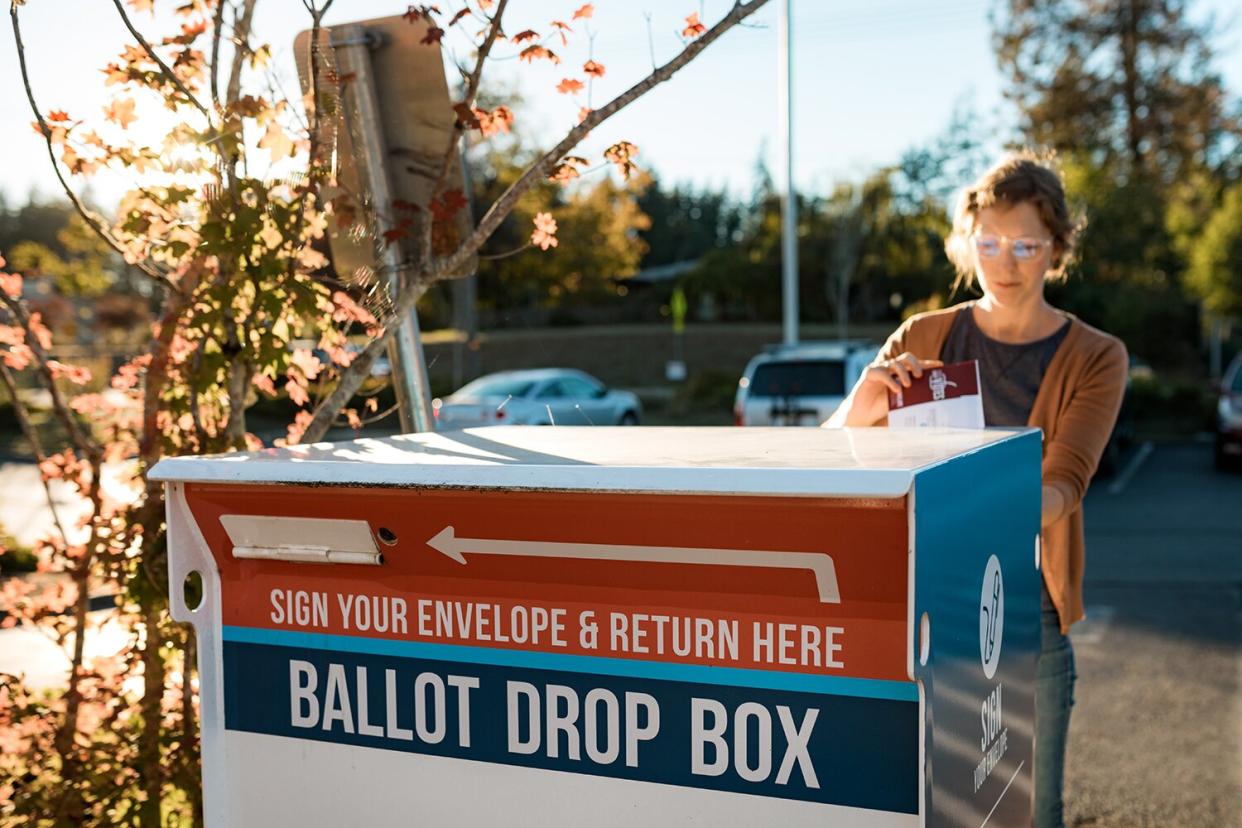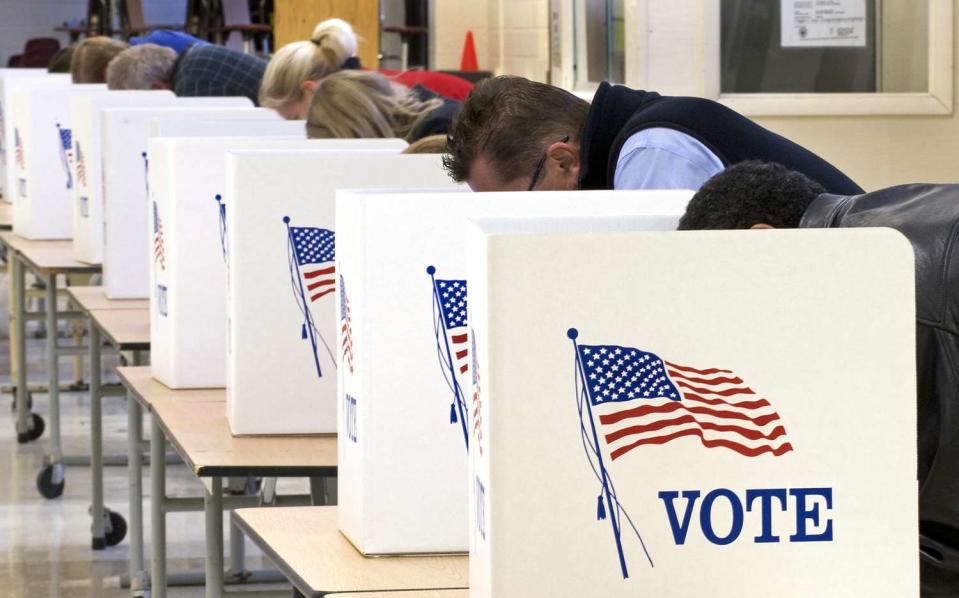Wisconsin Supreme Court Deems Absentee Ballot Drop Boxes Illegal Ahead of Primary Elections

- Oops!Something went wrong.Please try again later.
- Oops!Something went wrong.Please try again later.
- Oops!Something went wrong.Please try again later.
Getty
The Wisconsin Supreme Court declared most ballot drop boxes illegal on Friday as well as barring people from returning a ballot in person on behalf of another voter. The ruling was 4-3.
Talk of new legislation for ballot boxes began in January, after a Waukesha County judge declared that state law doesn't allow for unstaffed ballot drop boxes and requires voters to physically return their own absentee ballots, NPR reports.
In April, a ban on ballot drop boxes went into effect for local elections.
"The key phrase is 'in person' and it must be assigned its natural meaning," wrote conservative Justice Rebecca Bradley in the majority opinion. "'In person' denotes 'bodily presence' and the concept of doing something personally."
Justice Ann Walsh Bradley declared the decision "lamentable" in her dissent, but noted that it was not surprising.
"[The court] has seemingly taken the opportunity to make it harder to vote or to inject confusion into the process whenever it has been presented with the opportunity," she wrote. "Without justification, [the majority] fans the flames of electoral doubt that threaten our democracy."
Justice Brian Hagedorn wrote that the case "was not about ensuring everyone who wants to vote can" or about "making absentee voting more convenient and secure." Hagedorn continued, "This case is about applying the law as written; that's it."
Those who want to ban ballot drop boxes argue doing so will strengthen the integrity of elections and prevent voter fraud (though extensive research has shown that fraud is very rare). Critics say such measures will simply make it harder to vote, adding hurdles for those who can't easily get to a polling place to vote in person, or don't have the ability to take time off to do so.
RELATED: Michelle Obama Lauds Major New Voting Rights Bill and Urges Senate to Pass It
The decision also comes at a pivotal moment for the state as Wisconsin will hold its primaries on August 9, CNN reports. While Wisconsin Gov. Tony Evers, a Democrat, is seeking a second term, Sen. Ron Johnson, a Republican, is up for reelection in a close race that could help determine which party controls the U.S. Senate.
In a statement via Twitter on Friday, Evers called the decision "another in a long line of Wisconsin Republicans' successes to make it harder for Wisconsinites to exercise their right to vote, to undermine our free, fair, and secure elections, and to threaten our democracy."
Evers continued, "We should be working every day to protect that fundamental right by making it as easy as possible for every eligible voter to vote in Wisconsin."
Today’s #SCOWIS decision is another in a long line of Wisconsin Republicans’ successes to make it harder for Wisconsinites to exercise their right to vote, to undermine our free, fair, and secure elections, and to threaten our democracy. Read my full statement ⬇ pic.twitter.com/CBOwLoYveP
— Governor Tony Evers (@GovEvers) July 8, 2022
Critics also point to another consequence of making it difficult to drop absentee ballots in boxes or have a witness drop it off for them: those who can't physically bring their ballot to a clerk, or put an absentee ballot in the mail themselves, would not be able to vote at all.
Martha Chambers, who uses a wheelchair after being paralyzed from a horseback riding injury 27 years ago, described the challenges of voting to NPR earlier this year.
"I have the ability to put a pen stick in my mouth, so I can fill it in and I can sign the ballot and ask a witness to witness my ballot," Chambers told NPR. "They would have to place the ballot in the envelope and actually put it in the mail or take it to the clerk. It would be difficult for me to put a ballot in my mouth and put it in a mailbox; I couldn't reach that mailbox."
Stacy Ellingen, who has athetoid cerebral palsy, told NPR the statute makes her feel as if she is being "punished."
"I do feel like I'm being punished just because I'm physically not able to put a ballot in a mailbox," she told NPR.
"My caregivers help me fill out the ballot and put it in the mailbox. It's literally the only way for me to vote," she continued. "If this stands, I wouldn't be able to vote for the people actually making the decisions that affect my life."

PAUL J. RICHARDS/AFP via Getty
According to a report by the Stanford-MIT Healthy Elections Project, more voters used drop boxes in the 2020 general election than in any other election in American history.
In Wisconsin, approximately 2 million residents voted by absentee in the 2020 general election, a record number, NPR reports. According to the Wisconsin Elections Commission, 570 absentee ballot drop boxes were spread statewide by last spring.
The report notes that, in 2020 and prior, just eight states — Arizona, California, Colorado, Hawaii, Montana, New Mexico, Oregon and Washington state — had laws regulating drop boxes.
But in the years since, Republican lawmakers — many spurred by former President Donald Trump's attacks on mail-in voting — have moved to discontinue their use, despite there being no evidence that they lead to voter fraud.
According to research by Stateline, an initiative of The Pew Charitable Trusts, 19 states enacted new voting restrictions in 2021, including limits on early and mail-in voting. Some states (including Arizona and Georgia), have continued to add restrictions in 2022.
Molly Broadway, a training and technical support specialist at nonprofit advocacy agency Disability Rights Texas, told PEW the situation is "unfortunate" but not unforeseen.
"It's unfortunate," Broadway told PEW. "But when you are a community that has to fight for every single advancement of your public and private existence, continuing to fight is not a new thing. It's part of who you are. To move forward is just part of our second nature."

